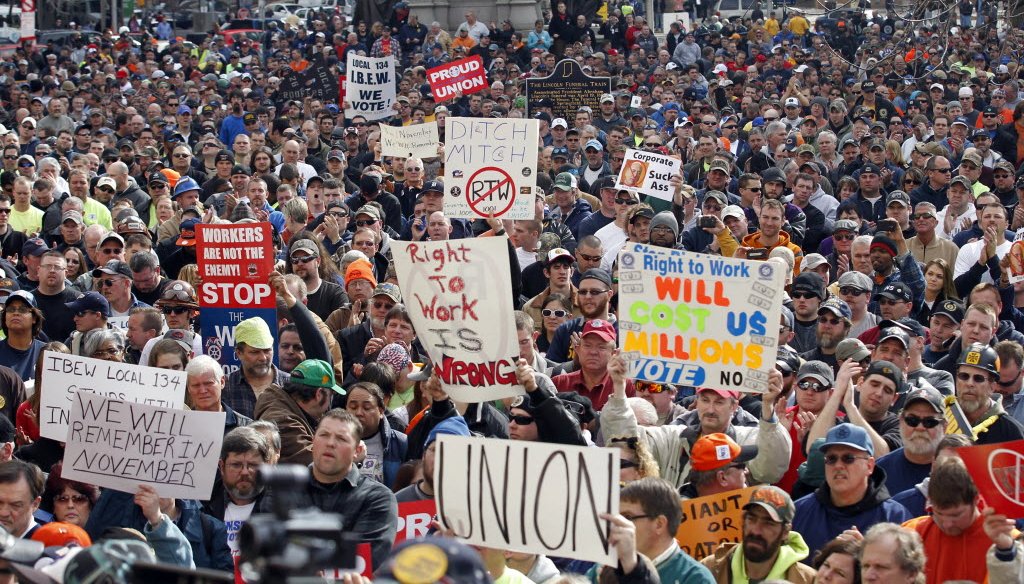Stand up for the facts!
Our only agenda is to publish the truth so you can be an informed participant in democracy.
We need your help.
I would like to contribute

Protesters gathered outside the Indiana Statehouse after the state Senate voted to pass a right to work bill on Feb. 1, 2012. The measure became law and was upheld by the Indiana Supreme Court in November 2014. (AP photo)
After celebrating big wins in the mid-term elections, leading Republicans exhibited a certain caginess about whether they would pursue the highly contentious matter of trying to make Wisconsin a "right to work" state.
Such a law -- not unlike Act 10, which sent hundreds of thousands of protesters pouring into the streets of Madison in 2011 -- would determine whether some private-sector workers can be required to join a labor union to get, or keep, a job.
Newly re-elected Gov. Scott Walker, who co-sponsored right-to-work legislation in 1993 as a freshman state lawmaker, perhaps was being mindful of his 2016 presidential prospects when he called such a measure a "distraction."
Assembly Speaker Robin Vos, a more vocal right to work supporter, expressed interest in moving forward. Yet he also questioned whether there is enough public support.
But then state government’s other major GOP player, Senate Majority Leader Scott Fitzgerald, made it clear his chamber would debate right to work as soon as a new, and more heavily Republican, Legislature convenes in January 2015.
"If we don’t do it now, when are we going to do it?" Fitzgerald told conservative talk show host Charlie Sykes on Dec. 4, 2014, two days after a GOP lawmaker announced he would introduce a right to work bill.
"And if we’re not going to do it," Fitzgerald continued, "then somebody needs to step up to the podium and say, here’s the reasons we’re not going to tackle this. It’s not going to be me."
The sudden urgency leads us to present, from a fact-checker’s perspective, some of what is known about right to work. Claims that have been tested on the Truth-O-Meter tend to fall into two categories -- income and jobs.
In a nutshell: There is some evidence of economic advantage in right to work states. But evidence is lacking that right to work, rather than other factors, is the cause.
Income
-
Right to work states "have higher rates of income growth."
We rated that claim Half True when Vos made it in 2010.
Vos was correct on the statistic. But there was no consensus among five economics professors we consulted on how important right-to-work status was in causing that growth. Among the other factors they cited: business incentives, corporate taxes and regulations.
-
Employees in right to work states make more money.
That statement, similar to Vos’, was made in 2013 by a Republican state lawmaker in Ohio. PolitiFact Ohio rated it Mostly False.
Our colleagues found that some economists who support right to work laws said wages were comparable or higher in right to work states when cost-of-living differences were taken into account. But federal data showed employees in right to work states earned less, and there wasn’t clear cause-and-effect evidence linking right to work laws and pay.
Jobs
-
Right to work states "have much lower level of unemployment than the union states do."
Fox News conservative talk show host Bill O’Reilly made that claim in 2011. PolitiFact National’s rating was Mostly True.
Our colleagues found it was a stretch to say unemployment was "much lower." The rate as of December 2010 was 9.17 percent in the 22 right-to-work states and 9.65 percent in the 28 non-right-to-work states.
-
"Six out of 10 of the highest unemployment rates" are in right to work states.
Ohio’s Democratic Party chairman made that statement in 2013, earning a Half True from PolitiFact Ohio. The figure was accurate, but our colleagues didn’t find any cause-and-effect evidence.
-
"Numerous studies have shown" that right to work laws "do not generate jobs and economic growth."
That claim was made in 2011 by a Democratic state lawmaker in New Jersey. PolitiFact New Jersey scored it Half True, finding that, according to different studies and economic experts, the evidence was mixed that right to work laws spur job growth.
-
Right to work states "are creating a lot more jobs today than the heavily unionized states."
PolitiFact Georgia rated that claim, made in 2011 by then-Republican presidential candidate Newt Gingrich, True.
There was a slight increase in the number of private-sector jobs in the 22 right-to-work states during the previous decade and following the recession, whereas there was a small decrease in both periods in the 28 other states. Nine of the nation’s 10 fastest-growing states over the previous decade were right-to-work states.
Before we close, another claim that took a slightly different tack.
-
Right to work states "constantly do not have budget deficits and they have very good business climates."
This statement, by a GOP state lawmaker in Rhode Island in 2012, was rated Mostly False by PolitiFact Rhode Island.
Going back to 2009, many right to work states did have budget deficits. And while those states tended to rank better in business-climate indexes, it was not clear that right to work was the reason.
To comment on this item, go to the Milwaukee Journal Sentinel’s web page.
Our Sources
WTMJ-AM, Charlie Sykes interview of Senate Majority Leader Scott Fitzgerald, Dec. 4, 2014
PolitiFact items as noted
























